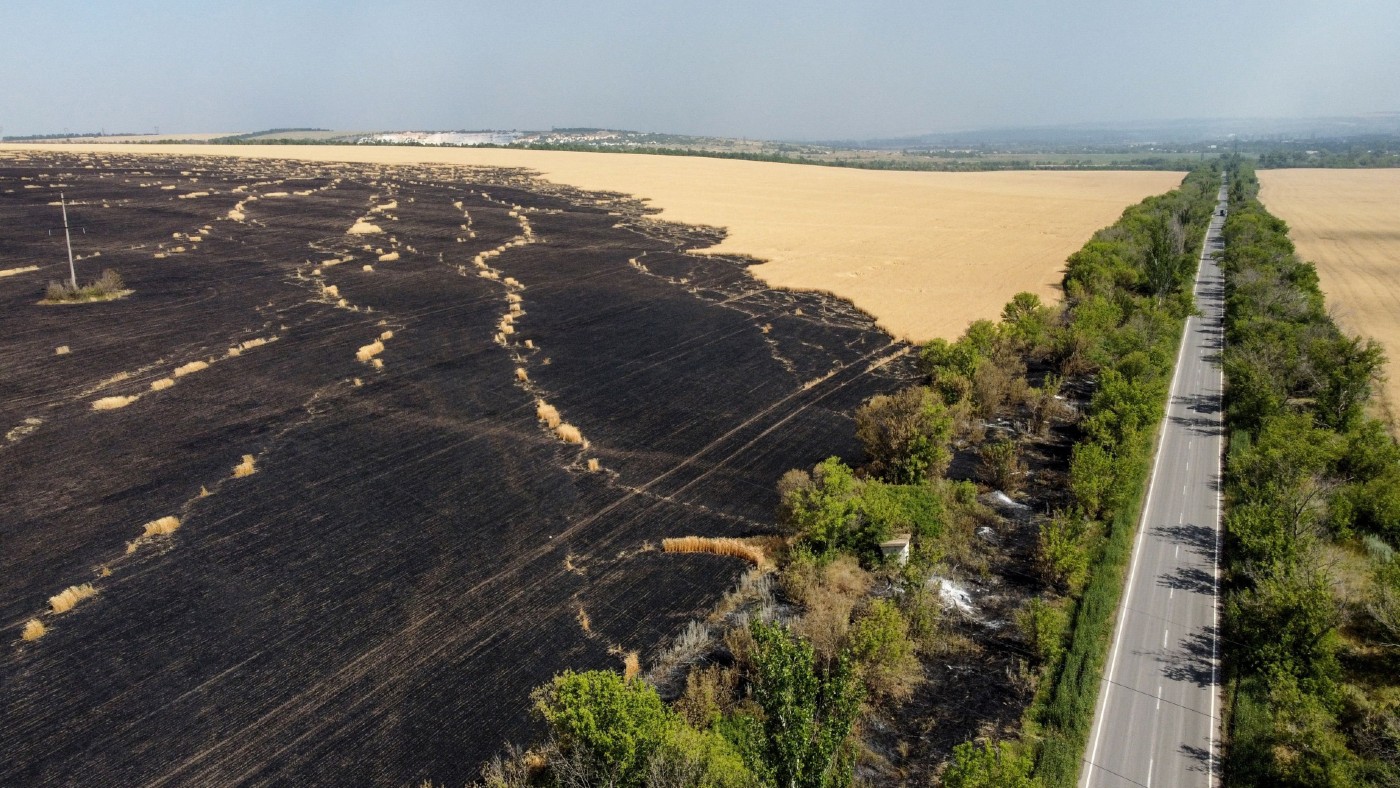Russia uses hunger as a weapon of war in Ukraine
Ukraine’s entire future is in peril as farmers are unable to harvest or sell grain

A free daily email with the biggest news stories of the day – and the best features from TheWeek.com
You are now subscribed
Your newsletter sign-up was successful
Ukraine and Russia aren’t just waging war on the battlefield, said Federica Marsi in Al Jazeera (Doha), they’re locked in conflict in the wheat field, too. Ukraine, the world’s fifth biggest wheat exporter, accounts for 9% of global sales. but since the Russian invasion, 22 million tons of grain have been rotting in silos inside the country. And with war raging, the wheat harvest is expected to fall by 40% this year. If the country’s farmers can’t farm or sell grain, Ukraine’s entire future is in peril.
Putin is using hunger as a weapon, said Daniel Hegedus on Transitions (Prague). And now that Russia has occupied most of Ukraine’s major ports and blockaded Kyiv’s main harbour, Odesa, the Black Sea has become the fulcrum of this conflict. Before the war, 90% of Ukraine’s wheat exports went by sea, and it’s quite a challenge to increase the amount sent overland by rail or truck. Ukraine’s railway has a wider gauge than its European neighbours, so every rail shipment must be unloaded and put on a different train. Thus, for now, “the best hope of averting famine” is to reopen exports from Odesa.
That’s where Turkey comes in, said Hilal Kaplan in Daily Sabah (Istanbul). Ankara has for months been striving to act as mediator in this conflict. It hasn’t made much headway because Ukraine has littered the Black Sea with mines to protect itself from Russian warships, making it hard to move goods out of its ports; and Kyiv, wary of the Russian threat, still refuses to clear the mines.
The Week
Escape your echo chamber. Get the facts behind the news, plus analysis from multiple perspectives.

Sign up for The Week's Free Newsletters
From our morning news briefing to a weekly Good News Newsletter, get the best of The Week delivered directly to your inbox.
From our morning news briefing to a weekly Good News Newsletter, get the best of The Week delivered directly to your inbox.
Yet Turkey has a powerful hand to play, as it controls access from the Black Sea to the Mediterranean. This month, Turkish officials, at Ukraine’s request, detained a Russian cargo ship about to enter the Bosphorus on suspicion it was carrying 7,000 tonnes of Ukrainian grain stolen from the occupied port of Berdyansk. Kyiv claims Moscow has stolen 600,000 tonnes in total from its occupied territories to sell abroad, this being just the latest load.
Turkey is being duplicitous, as you can see from the way it has now let the ship sail on, said Timothy Ash in the Kyiv Post. It claims to be standing up for Ukraine’s interests, but it’s actually negotiating directly with Moscow, and has made “zero effort” to involve Kyiv or acknowledge its need for security guarantees before demining its ports. President Erdogan is unconcerned about the costs to Ukraine; he just sees an end to the war as the best way to ease Turkey’s economic crisis ahead of elections next year.
The good news said Leonid Bershidsky on Bloomberg (New York), is that even with its ports blocked, Ukraine has kept up a sizeable export stream. Meanwhile, the forecast of a bumper grain harvest in several other countries is driving wheat prices down. A “full-blown food crisis” is not, thankfully, on the cards.
A free daily email with the biggest news stories of the day – and the best features from TheWeek.com
-
 Health insurance: Premiums soar as ACA subsidies end
Health insurance: Premiums soar as ACA subsidies endFeature 1.4 million people have dropped coverage
-
 Anthropic: AI triggers the ‘SaaSpocalypse’
Anthropic: AI triggers the ‘SaaSpocalypse’Feature A grim reaper for software services?
-
 NIH director Bhattacharya tapped as acting CDC head
NIH director Bhattacharya tapped as acting CDC headSpeed Read Jay Bhattacharya, a critic of the CDC’s Covid-19 response, will now lead the Centers for Disease Control and Prevention
-
 Corruption: The spy sheikh and the president
Corruption: The spy sheikh and the presidentFeature Trump is at the center of another scandal
-
 Putin’s shadow war
Putin’s shadow warFeature The Kremlin is waging a campaign of sabotage and subversion against Ukraine’s allies in the West
-
 The fall of the generals: China’s military purge
The fall of the generals: China’s military purgeIn the Spotlight Xi Jinping’s extraordinary removal of senior general proves that no-one is safe from anti-corruption drive that has investigated millions
-
 Epstein files topple law CEO, roil UK government
Epstein files topple law CEO, roil UK governmentSpeed Read Peter Mandelson, Britain’s former ambassador to the US, is caught up in the scandal
-
 Iran and US prepare to meet after skirmishes
Iran and US prepare to meet after skirmishesSpeed Read The incident comes amid heightened tensions in the Middle East
-
 Syria’s Kurds: abandoned by their US ally
Syria’s Kurds: abandoned by their US allyTalking Point Ahmed al-Sharaa’s lightning offensive against Syrian Kurdistan belies his promise to respect the country’s ethnic minorities
-
 Israel retrieves final hostage’s body from Gaza
Israel retrieves final hostage’s body from GazaSpeed Read The 24-year-old police officer was killed during the initial Hamas attack
-
 China’s Xi targets top general in growing purge
China’s Xi targets top general in growing purgeSpeed Read Zhang Youxia is being investigated over ‘grave violations’ of the law